#Silicone Valley Bank
Explore tagged Tumblr posts
Text
People causing a run on the bank because their accounts were only ensured up to $250,000.:

Me who only has two digits in my bank account:

7 notes
·
View notes
Text


And SVB donated $50 million to the Democratic party as well.. Then, bailed out with our tax dollars.
3 notes
·
View notes
Text
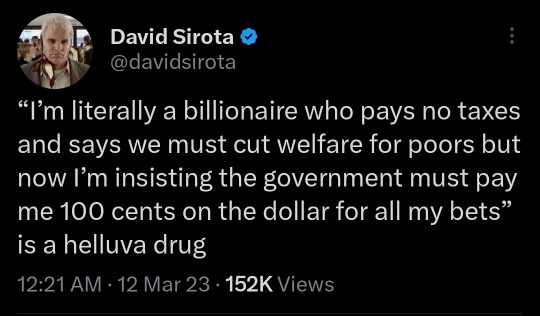
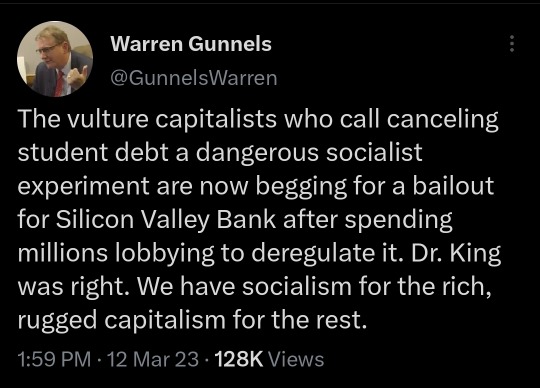
We have to end this capitalist construct.
19K notes
·
View notes
Text
Democrats do it again!
The more we look the more is discovered about the deceitful, traitor behavior of the Democrats and the Biden anti American administration. Now it has been discovered that the Silicon Valley Bank was established with a partnership with Shanghai Pudong Development Bank created a partnership called the SPD Silicon Valley Bank. No wonder Biden is FULLY replacing money lost in this bank fiasco well beyond the $250,000 per account, Looks like it is because this bank and SSVB played a role in putting up the4 money to finance Chinese development in tech industries and providing information to Chinese regulators. As well as helping Chinese get funding from this US Bank.
Just when are the American people going to stop these out of control domestic terrorists called DEMOCRATS
1 note
·
View note
Text


When FUD meets FOMO.
0 notes
Text
I hate it here
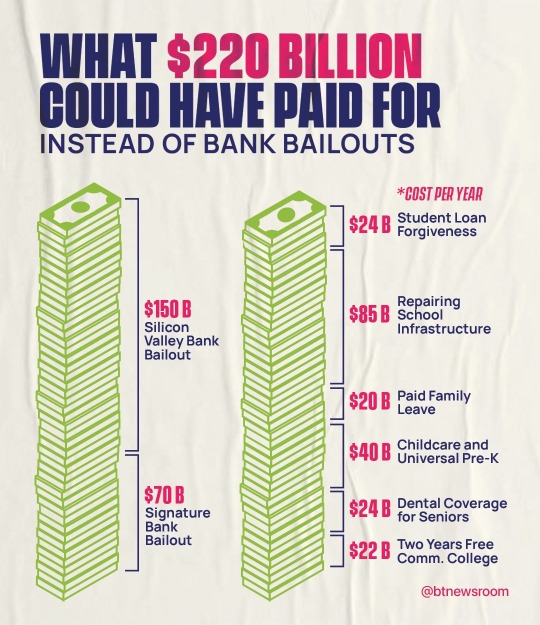
Let this be a lesson against believing politicians lies.
Keeping wealth concentrated in the 1% is the end goal of capitalism.
They will do whatever is necessary to keep the working class desperate and dependent on the system that impoverishes them.
#at what point to wh break out the guillotine#i’m so serious#capitalism#late stage capitalism#silicon valley bank#bank bailout#corruption#corporate corruption#corporate greed#eat the rich#tax the 1%#tax the rich#government bailout
8K notes
·
View notes
Text
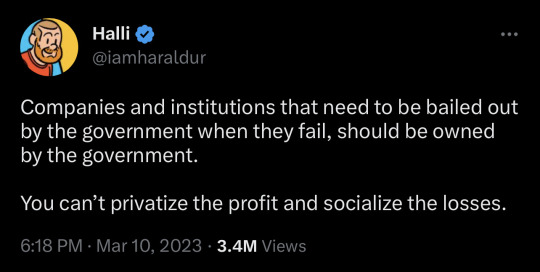
"We all too often have socialism for the rich and rugged free market capitalism for the poor."
—Martin Luther King Jr.
#politics#banking#privatized profits#socialized losses#capitalism#mlkjr#halli is cool#svb#silicon valley bank#privatized profits socialized losses
2K notes
·
View notes
Link
The collapse of Silicon Valley Bank adds to the growing list of evidence we have that the model at the core of the tech industry is deeply flawed, while showing how wrong we ever were to place any faith in the depraved billionaires who lord over it. They spent the past fifteen years eroding the position of workers, extending surveillance practices, funding monopolistic endeavors to destroy traditional industries, and ultimately creating bubbles they knew would burst, but which they hoped to profit off. They pushed a form of rugged individualism where everyone was expected be constantly in competition with one another, and the government would be scaled back as much as possible to get out of the way of their unethical profiteering — at least until they needed the government to step in and save them from themselves.
Already, we’re seeing this whole debacle being used to feed into the more pernicious narratives tech’s most powerful people are pushing to maintain their positions. We know that Peter Thiel is funding far-right political campaigns and Elon Musk is outwardly aligning himself with right-wing culture warriors, but those perspectives are much more entrenched in the Valley than has long been admitted, particularly among the venture capitalists and executive class. For years, the narrative of the tech industry was that it was run by conscientious liberals, but no one can reasonably argue that any longer — if it was ever truly anything more than a marketing pitch for a particular moment in US politics.
[...]
After years of being treated as our saviors, they haven’t responded well to the increased criticism leveled at their industry and the role they’ve played in all the ways tech has made the world a far worse place. People are getting fed up with rampaging Goliaths who want to be treated as heroic Davids until the end of their days. As a result, they’re more openly turning to the extreme right, forging new political alliances, and making open declarations about how they want to continue shaping the world to suit their desires.
482 notes
·
View notes
Text




268 notes
·
View notes
Photo

Mattie Lubchansky.
257 notes
·
View notes
Text
The Golden Rule (them what has the gold makes the rules)
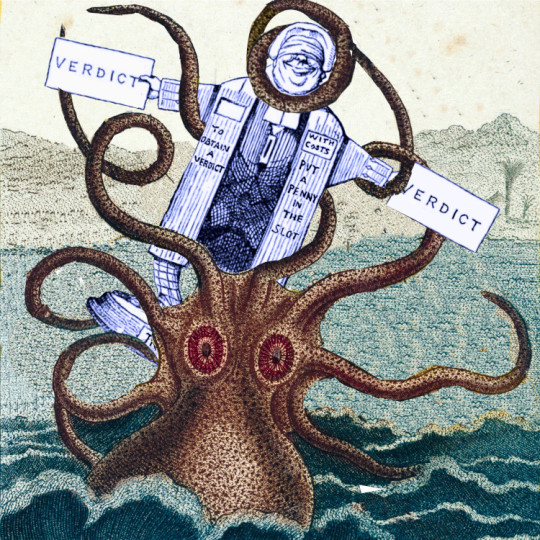
For many Constitutional law scholars, last years' Dobbs decision on abortion rights at the Supreme Court came as a dismaying shock, because it showed conclusively that conlaw wasn't a realm of ideologically consistent intellectual foment, but rather, a matter of politics.
If you'd like an essay-formatted version of this post to read or share, here's a link to it on pluralistic.net, my surveillance-free, ad-free, tracker-free blog:
https://pluralistic.net/2023/03/25/consequentialism/#dotards-in-robes
Writing for Credit Slips, the finance law scholar Adam Levitin admits to feeling a bit of schadenfreude in that moment. The "blue collar" law scholars in "grubby" banking and money fields have always treated the conlaw set as "slightly clueless toffs":
https://www.creditslips.org/creditslips/2023/03/the-death-of-dodd-frank-banking-laws-dobbs-moment.html
As a field, conlaw fiercely resists the idea that their field is "largely a battle of normative opinions, without any quasi-objective touchstone or clearly right or wrong answers." Finance law, by contrast, firmly roots its understanding of outcomes in expediency and politics as much as the text of the law.
And of course, every conlaw scholar must know that - at certain points - the Supremes' most consequential decisions were political, overturning jurisprudence based on shifting cultural attitudes.
Think of Abraham Lincoln, whose anti-slavery laws were repeatedly struck down by the SCOTUS of the day. Lincoln's predecessors had filled the court with pro-slavery southerners who remained on the bench long after their home states had seceded from the Union:
https://theconversation.com/packing-the-court-amid-national-crises-lincoln-and-his-republicans-remade-the-supreme-court-to-fit-their-agenda-147139
That court ruled in Dred Scott that Black people were "so far inferior that they had no rights which the white man was bound to respect, and that the negro might justly and lawfully be reduced to slavery for his benefit":
https://teachingamericanhistory.org/library/document/dred-scott-v-sandford/
Small wonder that the Supreme Court was considered "the last stronghold of Southern power." The court consistently ruled against Lincoln and Lincoln simply ignored their rulings:
https://constitutioncenter.org/blog/lincoln-and-taneys-great-writ-showdown
Eventually, Lincoln hit on a very honorable solution to an illegitimate court that frustrated the political will of democratically accountable lawmakers: pack the court. He reorganized the Federal Circuits to purge federal judges who supported the Confederacy.
He also filled SCOTUS vacancies with loyalists. Even so, that didn't get him a majority - but he didn't need a majority - the political support and momentum of the anti-slavery movement flipped those recalcitrant judges. The law didn't change, but once those judges saw that they were standing athwart a vast social upheaval, those judges' formerly iron certainties about the law crumbled.
That wasn't the only time the Supremes discovered heretofore unsuspected flexibilities in their granite certainty about the Constitution. Under FDR, a pro-oligarch Supreme Court consistently struck down the wildly popular New Deal policies that won him a landslide electoral victory.
These decisions were widely denounced by legal scholars - and the public. As the court annihilated worker protections and programs to rebuild the shattered economy, FDR used the bully pulpit to call the court a "no-man's-land where no Government— State or Federal—can function":
https://www.smithsonianmag.com/history/when-franklin-roosevelt-clashed-with-the-supreme-court-and-lost-78497994/
FDR proposed age limits on judges - which was just a roundabout way of forcing the retirement of the long-serving judges who'd been appointed by the Gilded Age plutocrats whose greed had precipitated the Great Depression. Forcing retirements on the "nine old men" would open up seats for FDR to fill.
When the Supremes refused to countenance such a matter, FDR went to Congress and demanded the authority to appoint a new, younger judge for every over-70 judge who wouldn't retire (contrary to popular mythology, there is no law that sets the number of Supreme Court justices at nine and the number has fluctuated widely through the history of the US).
For the next 168 days, the only newsworthy subject was the legitimacy of the Supreme Court. It filled every newspaper, barroom and workplace conversation. The GOP was demolished in the 1936 election, which were seen as a referendum on the Supreme Court's legitimacy - a referendum that SCOTUS decisively lost.
Soon, it was clear that FDR had the majority he needed to let him appoint new judges. And then...The court found religion. They upheld a minimum wage law that was substantively identical to other laws they'd struck down just a little while before.
They upheld NLRB rulings that were basically indistinguishable from others they'd invalidated. They reversed themselves on interstate commerce and opened the door to regulating coal mines. Then they came for sweatshop garment factories. The political will to pack the court weakened - but FDR still got his court, without having to pack it. The law was subservient to politics.
In the decades since, we've allowed the myth of ivory-tower conlaw to grow unchallenged, maintaining the pretense - so beloved of the Federalist Society - that the law is a "textual" matter. The sleight of hand is obvious: every oppressor wants to claim that they're "normal" while their opponents are "political." Paying women less then men, or Black people less than white people, is "the market"; while demands for pay equity are "political."
Jurisprudence reflects politics and can only ever reflect politics. The law must deal in ideas like "fairness" and "reasonableness," and these concepts change and change again. Judges' authority only comes secondarily from their bailiffs and "peace officers" - a judge's true authority comes from their perceived legitimacy.
Judges and enforcers know this, even when they don't admit it, which is why they spend so much effort on set-dressing - robes and gavels and somber paneling and formal language. Deep down, they're theater kids with pretensions.
That's what makes the decision to bail out Silicon Valley Bank so distressing for finance law scholars like Levitin: they understand their law to be grounded in prudence and the SVB bailout is so reckless. That's why Levitin calls the SVB bailout "banking law's Dobbs moment."
SVB is a bank that increased its executive compensation in lockstep with the recklessness of their management, doubling CEO Greg Becker's bonuses as he decreased the bank's reliability:
https://www.ft.com/content/02ff2860-2d5b-4e21-96af-cef596bff58e
Becker liquidated his stock just before his bank collapsed, cashing out twice on that recklessness:
https://abcnews.go.com/Business/svb-execs-sold-millions-company-stock-lead-collapse/story?id=97937058
All of SVB's execs got bonuses just hours before the bank failed:
https://www.cnbc.com/2023/03/11/silicon-valley-bank-employees-received-bonuses-hours-before-takeover.html
That's what makes the bailout so dismaying. It involves an exotic (to put it mildly; "absurd" also springs to mind) interpretation of the FDIC's statutory authority and the contours of the Dodd-Frank Act, passed after the Great Financial Crisis to ensure that the public would never reward reckless banks for failure.
As Levitin writes, "I really don't know how one can teach prudential banking regulation after SVB. How can you teach the students the formal rules—supervision, exposure and concentration limits, prompt corrective action, deposit insurance caps—when you know that the rules aren't followed?"
In other words, as with Dobbs, we have enforcers and judges behaving as though they are certain that they can maintain legitimacy in the face of widespread dismay at their actions. The politics revealed by these choices are the politics of impunity, a bedrock belief that we don't matter anymore and we can all just go fuck ourselves.
That's why SVB's apologists are so unhinged. When they argue that we had to bail out SVB because otherwise depositors would pile into Jpmorgan and other already Too Big to Fail/Too Big to Jail banks, they excluded the possibility that we'd create public banks that would break free of this seeming necessity:
https://pluralistic.net/2023/03/15/mon-dieu-les-guillotines/#ceci-nes-pas-une-bailout
When they argue that giving $2B to SVB's investors (because they were also depositors in the bank they crashed) that it's not "bailing out investors," they're ignoring the possibility that if we're gonna make up new interpretations of Dodd-Frank, we could simply tack on a "no, fuck those guys, they get nothing" rider:
https://pluralistic.net/2023/03/18/2-billion-here-2-billion-there/#socialism-for-the-rich
When they argue that they just want to save "small businesses" and "startups," they ignore the possibility that if we're going to find political will to save a bank whose balance-sheet was 90+% billionaire VC money, we might also find political will to impose conditions on the bail-ees. Like, if we're gonna save those depositors in the name of "saving jobs" we could make them sign legally binding pledges never to lay off another worker within 10 years of a stock buyback or dividend:
https://pluralistic.net/2023/03/21/tech-workers/#sharpen-your-blades-boys
The fact that none of this is on the table tells us a lot about how elites view their position in society. Specifically, it tells us that they think that the majority of us should get nothing but scraps from their tables.
They haven't made a secret of this. 40 years ago, the antitrust bar underwent a hostile takeover by billionaires' lickspittles from the Chicago School of Economics, who explicitly argued that monopolies were good and demanded that judges ignore 75 years of jurisprudence and use antitrust law to defend monopolies:
https://www.eff.org/deeplinks/2021/08/party-its-1979-og-antitrust-back-baby
The Chicago School's paymasters funded lavish junkets - the Manne Seminars - where 40% of the federal judiciary attended luxury re-education camps to teach them to love monopolies:
https://pluralistic.net/2021/08/13/post-bork-era/#manne-down
Today, those judges and the lawyers who appear before them argue that any "textual" interpretation of antitrust law - say, an interpretation that acts against monopolies - is laughable, ahistorical nonsense that "flies in the face of precedent." And yeah, it does:
https://publicknowledge.org/no-pain-no-gain-ftc-loses-bid-to-block-facebooks-acquisition-of-within/
It flies in the face of the illegitimate, corporate-purchased precedent that turned America into an oligarch's playground. It very strictly adheres to the new precedent that politics will (someday) force upon the law.
We see this in play with the copyright case against the Internet Archive, which a lower court badly fumbled yesterday, ruling against the right of libraries to scan their print holdings and lend them out because there is a "licensed" ebooks from publishers - ebooks that cost many multiples of the print editions and self-destruct after just a few lend-outs:
https://blog.archive.org/2023/03/25/the-fight-continues/
The politics here are obvious. As Brewster Kahle put it, this decision conceives of libraries as "customer service departments for corporate database products." The truth is that libraries are ancient, bedrock institutions. Libraries are older than copyright. They're older than printing. Than paper. Than commerce.
The realpolitik of this decision - and the publishing strategists at the Big Five publishers who support it - is that the party is over for us plebs, the age of public goods is behind us, and we should go back belowstairs and get used to tugging our forelocks again:
https://doctorow.medium.com/the-end-of-the-road-to-serfdom-bfad6f3b35a9
The law is political. The fight over these decisions to create socialism for the rich and rugged individualism for the poor is a political fight. Yes, we can and should call on Congress to amend the statutes to clarify them, in small words that even Supreme Court judges and Chicago-poisoned economists can understand. But that in itself won't make change - what will make change is the same thing that has always made change: politics.
[Image ID: A kraken strangling a coin-operated judge automata whose robes of office bear text reading 'to obtain a verdict/put a penny in the slot' and 'with costs.' He bears two signs reading 'VERDICT.']
I’m kickstarting the audiobook for my next novel, a post-cyberpunk anti-finance finance thriller about Silicon Valley scams called Red Team Blues. Amazon’s Audible refuses to carry my audiobooks because they’re DRM free, but crowdfunding makes them possible.
#pluralistic#manne seminars#dobbs#abortion rights#svb#silicon valley bank#adam levitin#conlaw#law#consequentialism#financial crises#constitutionalism#textualism#fedsoc#federalist society#credit slips
87 notes
·
View notes
Text



Don't wait and be a panic buyer once the SHTF
#Silicone Valley Bank#financial collapse#government failure#get prepared#self reliance#mike glover actual#mike glover
4 notes
·
View notes
Photo
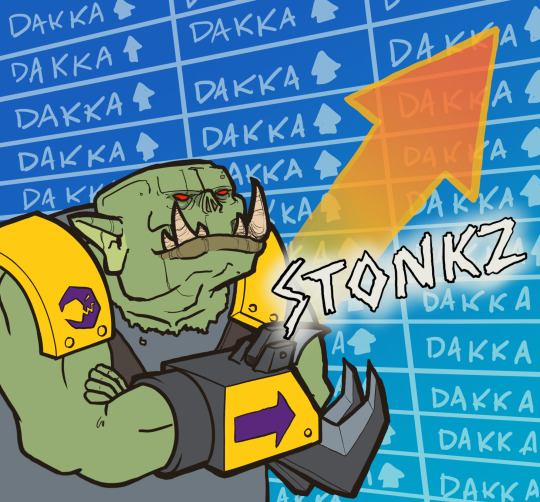
It’s all lines and shit, fuck it.
127 notes
·
View notes
Photo

@tolstoybb
#politics#the left#banking#silicon valley#venture capital#venture capitalism#vulture capitalism#tech industry
100 notes
·
View notes

